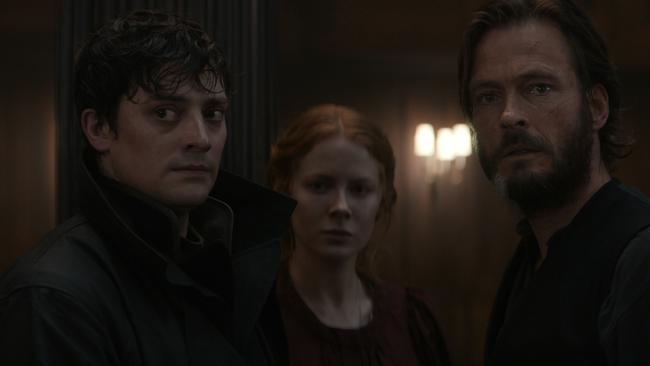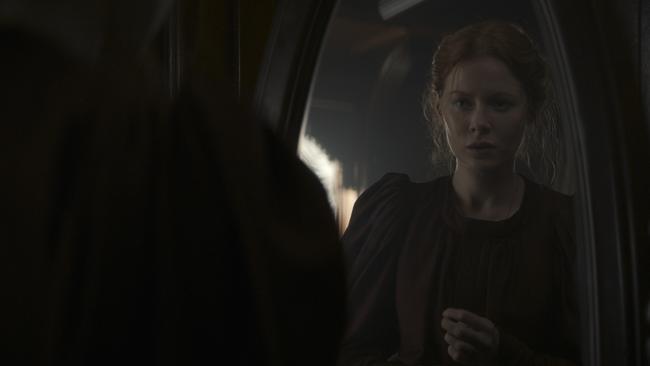1899 is the most unusual show to arrive this year
The rich world of 1899, infused with mysteries and symbolism, is a daring Netflix hit that is not for everyone.

1899 is the most unusual show to arrive this year, complex and challenging while undeniably aesthetically luscious. And utterly riveting, though it’s a deliberately confounding production that demands the utmost attention. While not to everyone’s taste, it has been a big hit for Netflix.
It’s from German creators Baran bo Odar and Jantje Friese who gave Netflix one of its first international hits in Dark, the 2017 series built around a seemingly never-ending cycle of time travel paradoxes involving multiple families in the German town of Winden. It was about time loops, parallel worlds and alternate realities – “something weird and wild and crazy”, according to its creators.
1899 is far grander in its world-building, its strange happenings taking place on a massive, four-funnel liner, a steamship whose stacks expel smoke and fumes from below decks, where labourers work shovelling coal into the huge furnaces.
The eight-episode series stars a large ensemble cast led by Emily Beecham (The Pursuit of Love), Aneurin Barnard (Dunkirk) and Andreas Pietschmann (Dark), alongside Anton Lesser (Game of Thrones).
Bo Odar directs and Friese heads a large group of writers. The elaborate, largely electronic soundtrack is mainly by composer Ben Frost but also features some great music pieces by iconic bands such as Deep Purple. The theme song is a cover by Eliot Sumner of White Rabbit by Jefferson Airplane, inspired by Lewis Carroll’s Alice in Wonderland. For composer Grace Slick, it’s a song “about following your curiosity – the White Rabbit is your curiosity”, though the notion of trippy, mind expansion certainly suits the show as well.
It’s 1899, the year of the title, and the world is on the threshold of a new century and a new future. (“There was something fascinating about exactly that moment in time,” Friese told Netflix blog Tudum. “What happened in that period is that modernism clashed with old beliefs. More scientific-oriented thinking started, while you still had very religious beliefs, and those two things pulled on each other, old and new.”)
The ship is carrying a group of more than 1000 passengers from Europe to New York. They speak many languages and have trouble understanding each other, though many have English. All seem to be hiding something, determined never to return to Europe.
The name of their ship is the Kerberos (or Cerberus) and if you know your Greek mythology, you’ll recognise the name of the monstrous watchdog of the underworld who devoured anyone who tried to escape the kingdom of Hades. And from the beginning of this intense, convoluted narrative, there is that sense of people being trapped, their memories muddled, motivations scrambled, carrying anger and resentment they don’t fully understand, each of them with these deeply held secrets.
It seems from the start this monstrous vessel will not give them up lightly. They are also anxious and apprehensive because a sister ship from the same company, the Prometheus, was lost at sea. Surely this can’t happen twice. Again, if you know your mythology Prometheus was a god who was something of a trickster who stole fire and gave it to humans but ended up chained to a rock as punishment.
1899 emerged as part of a lucrative deal with Netflix which included the second and third seasons of Dark, part of the streamer’s careful, well-calculated process of international expansion. Netflix began to partner with local production companies to create originals that would appeal to potential new subscribers in countries it was determined to conquer.
Some estimates suggest that, in 2016, Netflix invested approximately $5bn in international content creation.
Like Dark, 1899 is a highly intelligent version of that genre Variety calls the atmospheric puzzle show – its creators call it a “fun puzzle” – but it’s also a wonderful example of the way Netflix has encouraged international projects, 1899 featuring a cast from many different parts of the world, all speaking different languages.
Being true to the cultures and the languages was really important, according to Friese. “We wanted to explore this heart of Europe, where everyone comes from somewhere else and speaks a different language, and language defines so much of your culture and your behaviour,” she said.

The whole European angle was very important for these creators, they say, not only in terms of the story – inspired to some extent by the European migrant crisis – but also the way they were going to produce it. “It really had to be a European collaboration, not just cast but crew. We felt that with the past years of Europe being on the decline, we wanted to give a counterpoint to Brexit, and to nationalism rising in different countries, to go back to that idea of Europe and Europeans working and creating together.”
The first episode, The Ship, begins with a woman in the middle of a terrible dream. She sees a massive black pyramid, treacherous seas, and an image of a steamship. She also sees herself it seems being hauled away by two men in white gowns as a mysterious figure watches from some kind of portal. “I’m not crazy,” she shouts. “What have you done to my memory?”
As the dream starts, over images of turbulent black waters, she appears to be reciting Emily Dickinson’s poem The Brain Is Wider than the Sky in praise of the human mind’s ability to imagine, boundless in its potential. This sets an obvious context for what we about to witness as the show’s story unfolds.
She turns out to be Beecham’s Maura Franklin, a doctor specialling in the convolutions and intricacies of the brain, unable to practice because she is a woman. And on awakening she looks down at marks on her wrists that suggest she has indeed been restrained. She takes out a letter, written by her brother it seems, and we see a little note written on the envelope: “What is lost will be found”.
She walks to the ship’s ornate dining room where people are discussing the fate of the Prometheus. There’s an unhappy French honeymooning couple, Lucien and Clemence (Mathilde Ollivier and Jonas Bloquet), Spanish brothers Angel and priest Ramiro (Jose Pimentao and Miguel Bernardeau), and two odd Chinses women, one of whom appears to be a servant, Yuk Je and Ling Yi (Gabby Wong and Isabella Wei). Then there is the mysterious, garrulous English woman, Mrs Wilson, who seems to know a lot about Maura Franklin. The steerage we soon discover is stuffed with poorer passengers when Franklin is called upon to assist a pregnant woman having trouble with her unborn child.
Then the ship comes into contact with the Prometheus after strange messages and co-ordinates are received in the Kerberos’s bridge, the grizzled, heavy-drinking German captain (Andreas Pietschmann), turning his ship around to the intense disquiet of his passengers. As the ship starts to change direction, some of the guests grow suspicious and apprehensive of these adjustments. No one wants to head back.
It’s a superbly established first episode, puzzles firmly set, the camera constantly highlighting possible clues like the bold brass numbers on doors, or the handwriting present in multiple letters held by different characters, or the pyramid-shaped earrings someone wears. There’s a beguiling sense of doubt about everything we are shown and it’s impossible to guess just where bo Odar and Friese are taking us. As Friese says, it’s a story that “piles up questions”.
Much of the series was shot on a single sound stage using a new approach called The Volume, a marriage between video gaming and conventional filming, involving huge physical sets, equally massive LED panels that surround the action and the actors, and digital elements within the panels. “This is now the new thing where you still have something in the background which is like a huge gigantic TV screen, curved TV screen, or lots of screens put together,” bo Odar says. “But it’s simpler to explain, it’s a TV screen and the content that is on there is not 2D; it’s actually 3D because it’s connected to the camera, so whenever the camera moves, the background moves at the same time.”
It’s hard to figure how it all works technically – some say this process represents the future of filmmaking – but the results are extraordinary. The director says: “It’s basically being a child again in the sandbox, creating whatever, a weird world.”
1899 is a work of an undeniably coherent vision, even if at times it’s perplexing to watch, full of arcane symbolism, but its stylish pictorial vernacular is clever, and arresting. It’s obvious from the start that if you like your drama straightforward and linear this is not for you and you will realise that quickly as the first episode unfolds. There are mysteries inside mysteries, twists that turn out to only open up more conundrums, and constant riddles that resist easy interpretation.
1899, streaming on Netflix.




To join the conversation, please log in. Don't have an account? Register
Join the conversation, you are commenting as Logout